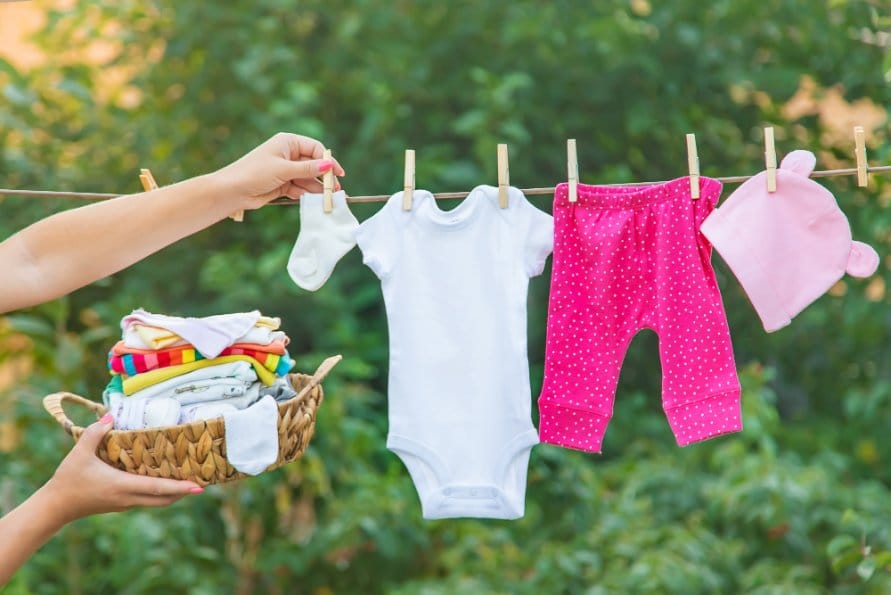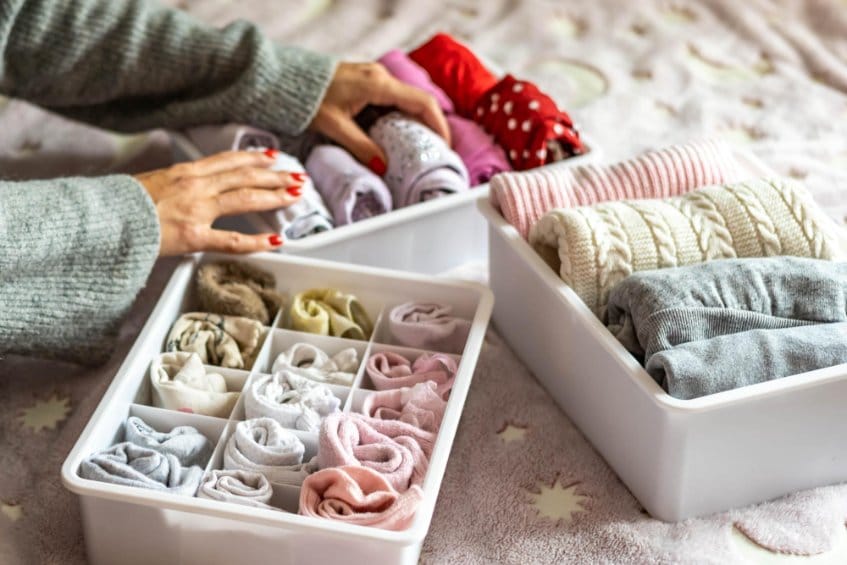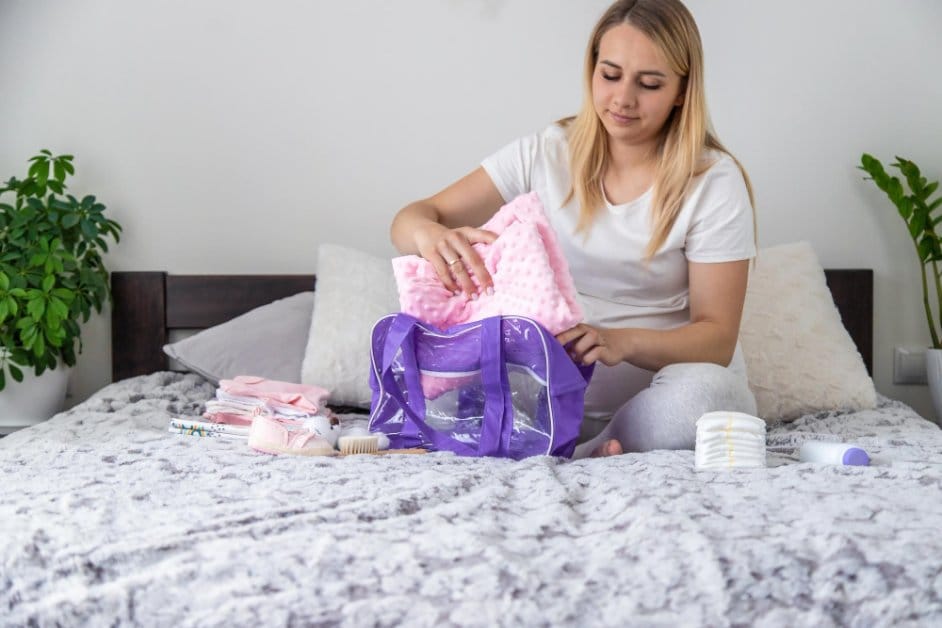Expert-Approved Methods, Age-Specific Guidelines, and Safe Alternatives for Sensitive Skin
Yes, you can use OxiClean on toddler clothes safely when you follow proper guidelines and choose the right formula for your child’s needs. The baby-specific version and free-and-clear formulations are specially designed for sensitive skin clothing, making them ideal choices for parents who want effective stain removal without harsh chemicals.
OxiClean works by breaking down into hydrogen peroxide and oxygen bubbles, which lift stains from fabric fibers without using chlorine bleach. This oxygen-based cleaning action is gentler than traditional bleaches while still being highly effective on common toddler messes like food spills, grass stains, and diaper accidents.
Before treating any garment, always test a small, hidden area first, especially on colored or delicate fabrics. The American Academy of Pediatrics recommends washing all baby clothes before first use, regardless of the cleaning products you plan to use.
The key to safe usage is choosing age-appropriate formulas, using proper concentrations, and ensuring complete rinsing to prevent residue that could irritate your toddler’s delicate skin.
Table of Contents
Understanding OxiClean’s Safety for Children’s Clothes
Understanding how OxiClean works and its safety profile helps parents make informed decisions about their child’s laundry care.
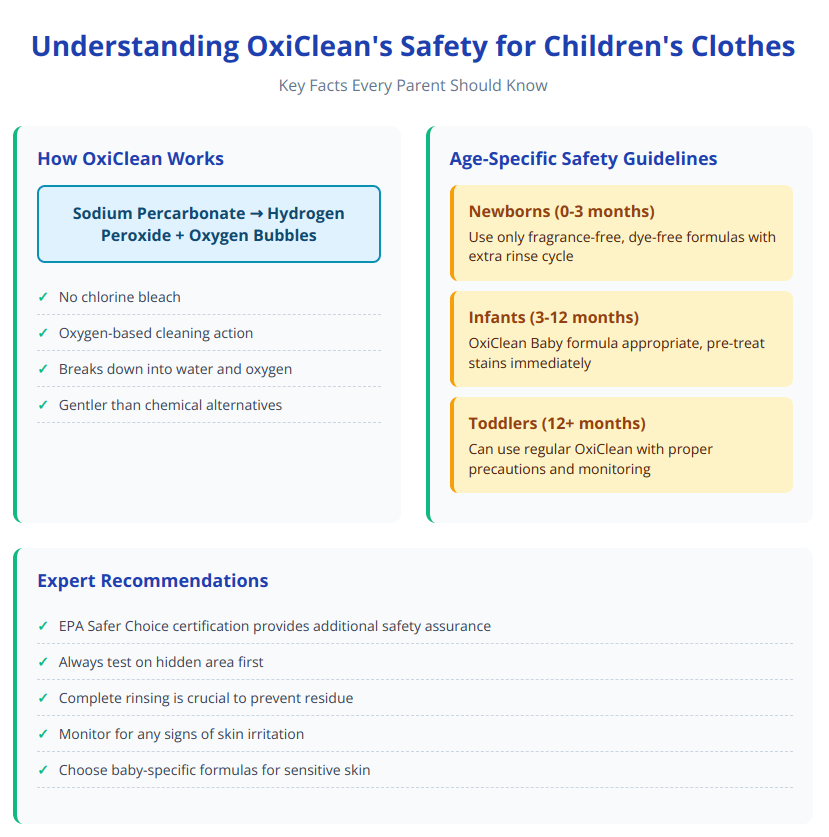
These safety guidelines form the foundation for using OxiClean effectively while protecting your child’s delicate skin.
What Makes OxiClean Work
OxiClean’s main active ingredient is sodium percarbonate, which breaks down into hydrogen peroxide and sodium carbonate when mixed with water. This oxygen-based formula creates bubbling action that lifts stains from fabric fibers without using chlorine bleach.
Unlike traditional bleaches, OxiClean doesn’t rely on harsh chemicals that can irritate young skin. The oxygen bubbles work mechanically to break apart stain particles, making it gentler than chemical alternatives while still being highly effective.
Age-Specific Safety Guidelines
Newborns (0-3 months):
- Use only fragrance-free, dye-free formulas
- Always run an extra rinse cycle
- Consider hand-washing delicate items first
- Watch for any signs of skin irritation
Infants (3-12 months):
- Regular OxiClean Baby formula is appropriate
- Pre-treat stains immediately when possible
- Maintain separate wash loads from adult clothing
Toddlers (12+ months):
- Can use regular OxiClean with proper precautions
- Teach proper safety around laundry products
- Continue monitoring for skin sensitivities
Medical Expert Recommendations
Pediatric dermatologists emphasize that while OxiClean is generally safe, parents should remain vigilant about residue. This is particularly important since Cleveland Clinic reports that up to 30% of children under age 2 have eczema, making them more susceptible to skin irritation from laundry products.
Dr. Jennifer Chen, a pediatric dermatologist at Children’s Hospital, notes: “The key is complete rinsing. Any detergent or additive left on fabric can cause contact dermatitis in sensitive children.”
The EPA’s Safer Choice certification on OxiClean Baby products provides additional assurance that ingredients meet strict safety standards for use around children.
Product Comparison: Which OxiClean is Right for Your Child?
Choosing the right OxiClean formula depends on your child’s age, skin sensitivity, and your specific stain-fighting needs.
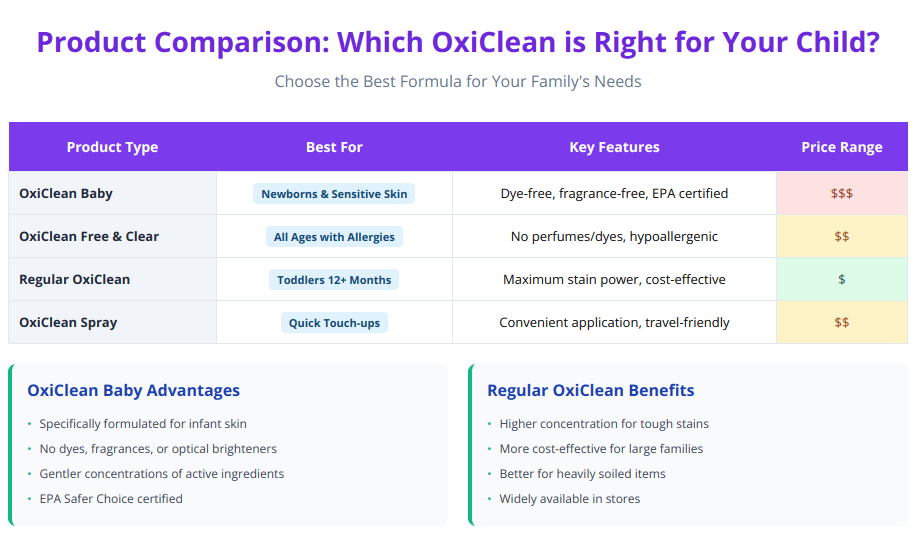
This comparison helps you select the most appropriate product while balancing effectiveness with safety for your child’s specific needs.
| Product Type | Best For | Key Features | Price Range |
|---|---|---|---|
| OxiClean Baby | Newborns & sensitive skin | Dye-free, fragrance-free, gentle formula | $$$ |
| OxiClean Free & Clear | All ages with allergies | No perfumes or dyes, hypoallergenic | $$ |
| Regular OxiClean | Toddlers 12+ months | Maximum stain power, cost-effective | $ |
| OxiClean Spray | Quick touch-ups | Convenient application, travel-friendly | $$ |
Is There a Difference Between Baby OxiClean and Regular OxiClean?
Yes, there are important differences:
OxiClean Baby:
- Specifically formulated for infant skin sensitivity
- Contains no dyes, fragrances, or optical brighteners
- Uses gentler concentrations of active ingredients
- EPA Safer Choice certified (which means every ingredient has been rigorously evaluated for safety)
Regular OxiClean:
- Higher concentration of sodium percarbonate
- May contain fragrances and brightening agents
- More cost-effective for larger families
- Better for heavily soiled items
Step-by-Step Guide: How to Use OxiClean Safely on Baby Clothes
Pre-Treatment Method
- Test First: Apply a small amount to an inconspicuous area and wait 10 minutes
- Mix Solution: Combine 1 tablespoon OxiClean with 1 cup warm water
- Apply Directly: Saturate the stain completely with the solution
- Wait: Let sit for 5-10 minutes (never longer than 6 hours)
- Rinse: Flush with cold water before washing
Real-World Testing: OxiClean on Baby Stains
Many parents want to see actual results before trying new products on their little one’s clothes. This helpful demonstration shows OxiClean being tested on common baby stains, giving you a realistic expectation of what the product can accomplish on typical toddler messes.
As you can see from the demonstration, OxiClean can be highly effective on baby clothes when used properly. The key takeaways from this testing are the importance of proper mixing, adequate soaking time, and thorough rinsing. Remember that while the video shows excellent results, always test on a hidden area first and follow the safety guidelines outlined in this article, especially for children with sensitive skin.
Now let’s look at the specific soaking techniques that work best for different types of stains.
Soaking Instructions
For tough stains:
- Fill a clean bucket with warm water
- Add 1 scoop OxiClean per gallon of water
- Stir until completely dissolved
- Submerge clothes for 1-6 hours maximum
- Wash immediately in regular cycle
Hot Water Technique for Protein Stains: For set-in stains from spit-up or formula, this method works exceptionally well:
- Dissolve OxiClean in boiling water (adult supervision required)
- Pour over stained items in a safe container
- Let cool and soak for 2-4 hours
- Wash as normal with extra rinse cycle
Machine Washing Guidelines
Top-Loading Machines:
- Fill with water first
- Add OxiClean and let dissolve
- Add detergent and clothes
- Use warm water setting when safe for fabric
High-Efficiency (HE) Machines:
- Add OxiClean directly to drum before clothes
- Do not mix with detergent in dispenser compartments
- Use recommended amount for HE machines (usually less)
Note that liquid formulations often rinse out more completely than powders, which can be beneficial for sensitive skin.
For precise measurements tailored to your specific situation, use our OxiClean Dosage Calculator to determine the exact amount needed based on your load size, stain severity, and product type.
Tackling Specific Toddler Stains
Different types of stains require different approaches. This quick reference guide helps you tackle common toddler messes effectively.
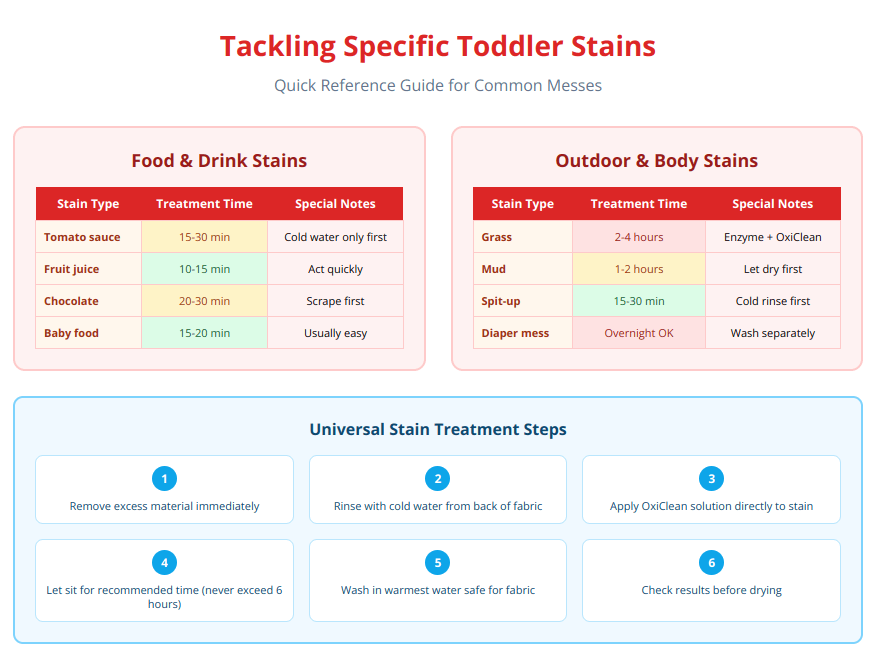
Remember, the key to successful stain removal is acting quickly and using the right technique for each type of mess.
Different stains require different treatment approaches. If you’re unsure what type of stain you’re dealing with, use our Visual Stain Identification Guide to properly identify the stain before choosing your treatment method.
Food and Drink Stains
Immediate Action Steps:
- Scrape away excess food gently
- Rinse with cold water from the back of the fabric
- Apply OxiClean paste (powder mixed with small amount of water)
- Let sit 10-15 minutes before washing
Common Food Stains and Solutions:
| Stain Type | Treatment Time | Special Notes |
|---|---|---|
| Tomato sauce | 15-30 minutes | Use cold water only initially |
| Fruit juice | 10-15 minutes | Act quickly to prevent setting |
| Chocolate | 20-30 minutes | Scrape first, avoid hot water |
| Baby food | 15-20 minutes | Usually comes out easily |
Grass, Mud, and Outdoor Stains
Outdoor play means tough stains that require strategic treatment:
- Let mud dry completely before treatment
- Brush off as much dried mud as possible
- Apply OxiClean solution and work in gently with soft brush
- Soak for 2-4 hours for best results
- Wash in warmest water safe for the fabric
For grass stains specifically, the combination of OxiClean with a small amount of regular laundry detergent creates a powerful paste that breaks down chlorophyll effectively.
Dealing with Bodily Fluids
Spit-up and Formula Stains:
- Rinse immediately with cold water
- Pre-treat with OxiClean solution
- Soak for minimum 1 hour
- Wash with extra rinse cycle
Diaper Accidents:
- Remove solid matter safely
- Rinse in cold water
- Apply OxiClean liberally
- Soak overnight if necessary
- Wash separately from other clothes
Safety Precautions and When NOT to Use OxiClean
Knowing when NOT to use OxiClean is just as important as knowing how to use it safely.
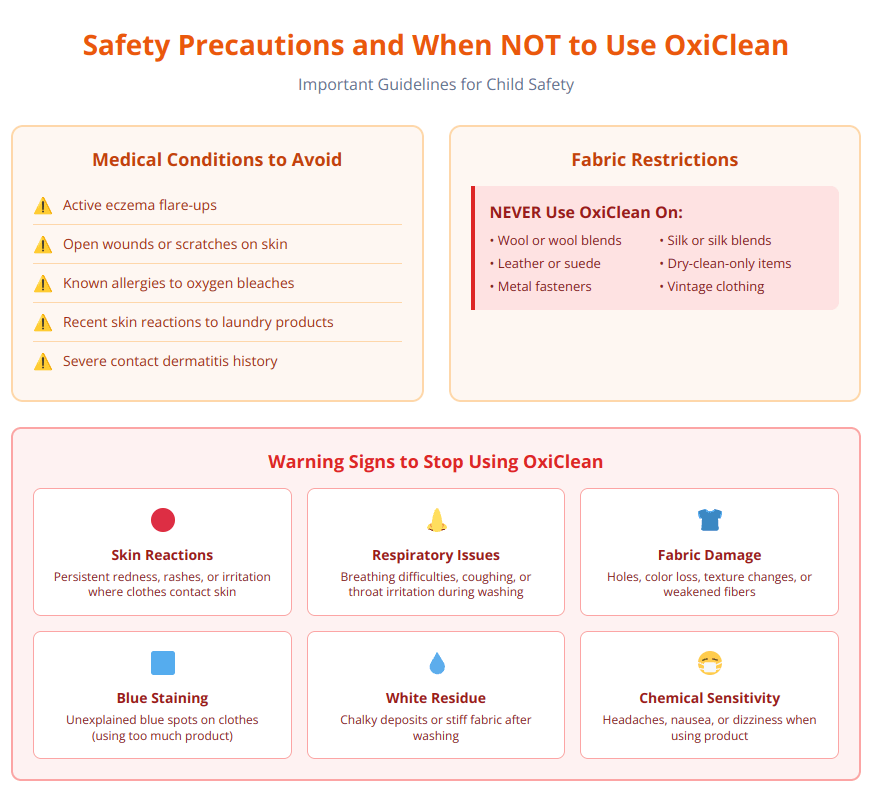
Always prioritize your child’s safety and discontinue use immediately if you notice any of these warning signs.
Fabric Restrictions
Never use OxiClean on:
- Wool or wool blends
- Silk or silk blends
- Leather or suede
- Dry-clean-only items
- Metal fasteners (remove or rinse immediately)
When to Avoid OxiClean
Medical Conditions:
- Active eczema flare-ups
- Open wounds or scratches on skin
- Known allergies to oxygen bleaches
- Recent skin reactions to laundry products
Fabric Concerns:
- Vintage or heirloom clothing
- Hand-knitted items
- Clothes with special finishes (water-repellent, etc.)
- Items with non-colorfast dyes
Signs You Should Stop Using OxiClean
Watch for these warning signs:
- Persistent skin redness after wearing washed clothes
- New rashes in areas where clothes contact skin
- Respiratory irritation during washing
- Fabric damage (holes, color loss, texture changes)
Natural and Safer Alternatives for Sensitive Children
For families with extremely sensitive children or those preferring natural options, these alternatives provide gentle yet effective stain removal.
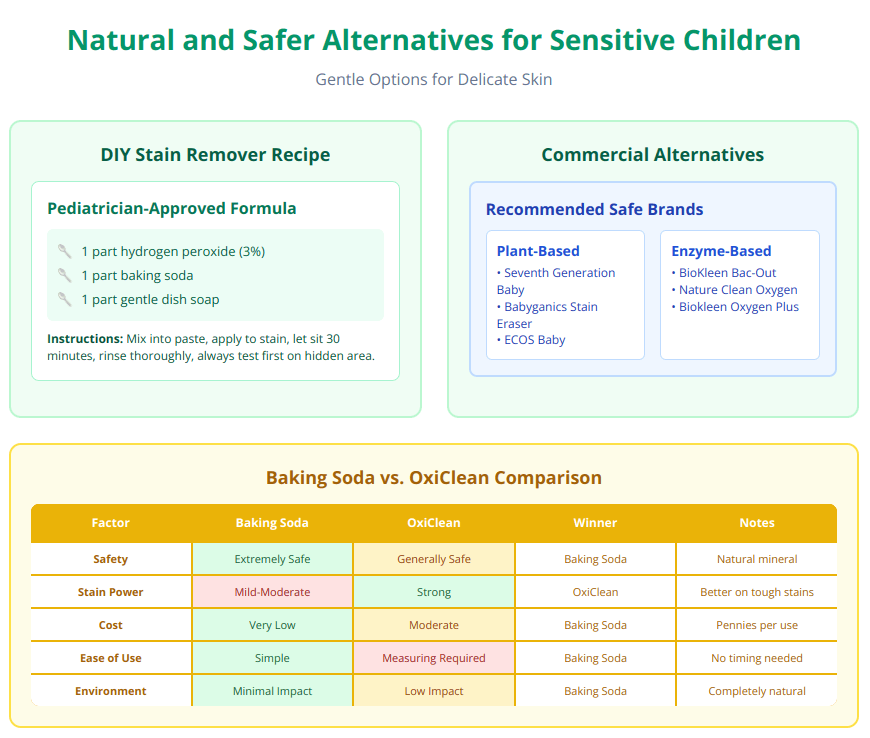
These natural alternatives offer peace of mind for parents who want the gentlest possible approach to stain removal.
DIY Stain Remover Recipe
For extremely sensitive skin, this pediatrician-approved recipe works well:
Ingredients:
- 1 part hydrogen peroxide (3% solution)
- 1 part baking soda
- 1 part gentle dish soap
Instructions:
- Mix ingredients into a paste
- Apply to stain and let sit 30 minutes
- Rinse thoroughly before washing
- Always test on hidden area first
Commercial Alternatives
Plant-Based Options:
- Seventh Generation Baby Stain Remover
- Babyganics Stain Remover
- ECOS Baby Stain Remover
Enzyme-Based Cleaners:
- BioKleen Bac-Out
- Biokleen Oxygen Bleach Plus
- Nature Clean Oxygen Bleach
Comparison: Baking Soda vs. OxiClean
| Factor | Baking Soda | OxiClean |
|---|---|---|
| Safety for babies | Extremely safe | Generally safe with precautions |
| Stain removal power | Mild to moderate | Strong |
| Cost | Very low | Moderate |
| Ease of use | Simple | Requires measuring/timing |
| Environmental impact | Minimal | Low (oxygen-based) |
Special Considerations for Different Fabric Types
Not all fabrics respond the same way to OxiClean treatment. Understanding fabric compatibility prevents damage while maximizing cleaning effectiveness.
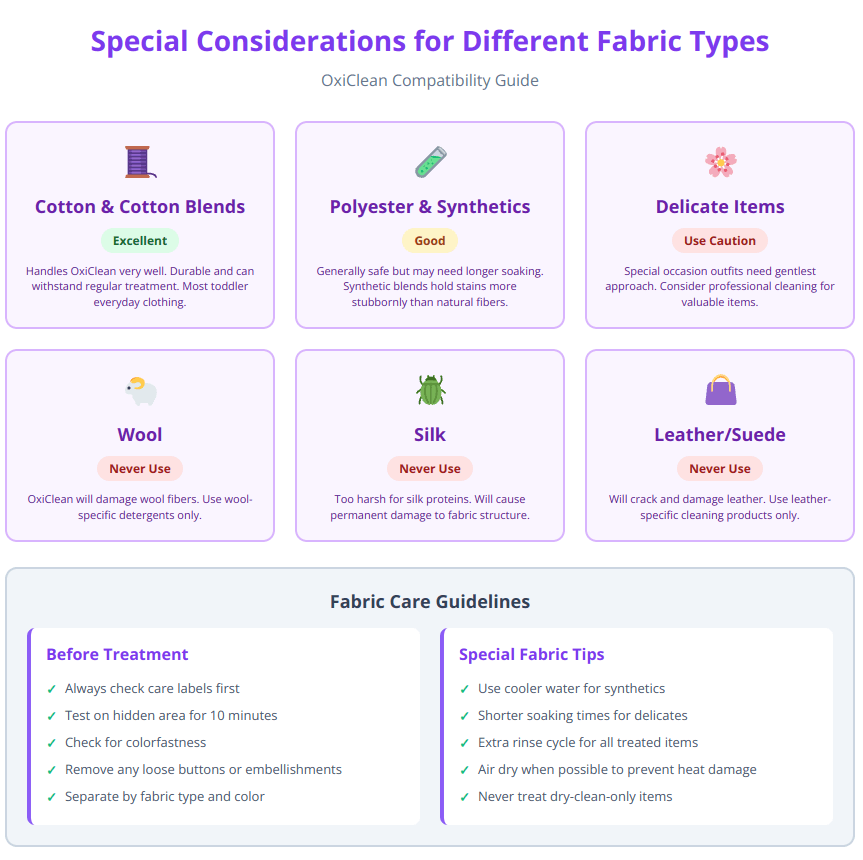
Following these fabric-specific guidelines ensures your child’s clothes stay beautiful and last longer while getting properly clean.
Cotton and Cotton Blends
Cotton responds excellently to OxiClean treatment. These durable cotton fabrics can handle regular OxiClean use without damage. Most toddler everyday clothing falls into this category.
Synthetic Fabrics
Polyester and synthetic blends are generally safe with OxiClean, but may require longer soaking times. These fabrics often hold onto stains more stubbornly than natural fibers.
Delicate Items
For special occasion outfits or delicate fabrics, always use the gentlest approach possible. Consider professional cleaning for valuable items.
Advanced Techniques and Pro Tips
For parents ready to tackle the most stubborn stains, these advanced techniques provide professional-level results while maintaining safety.
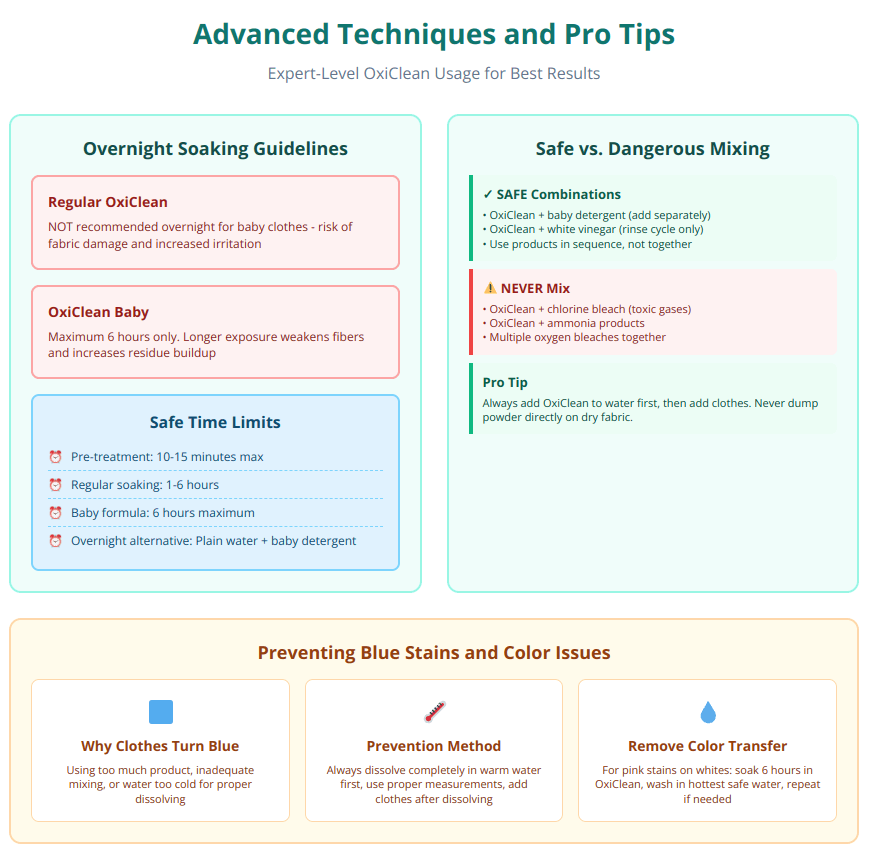
These advanced methods require more attention to detail but can save clothes that might otherwise be unsalvageable.
Overnight Soaking: Is It Safe?
For regular OxiClean: Not recommended for baby clothes due to potential fabric damage and increased irritation risk.
For OxiClean Baby: Maximum 6 hours soaking time. Longer exposure can weaken fabric fibers and increase residue buildup.
Safe overnight alternative: Soak in plain water with a small amount of baby detergent, then treat with OxiClean in the morning.
Mixing OxiClean with Other Products
Safe combinations:
- OxiClean + baby detergent (add separately to wash)
- OxiClean + white vinegar (in rinse cycle only)
Never mix:
- OxiClean + chlorine bleach (creates dangerous gases)
- OxiClean + ammonia-based products
- Multiple oxygen bleaches together
Preventing Blue Stains and Color Issues
Why clothes turn blue:
- Using too much OxiClean
- Inadequate mixing before adding clothes
- Water temperature too low for proper dissolving
Prevention tips:
- Always dissolve completely in warm water first
- Use proper measurements
- Add clothes after product is fully dissolved
Removing Color Transfer
Pink stains on white clothes: OxiClean can effectively remove color bleeding:
- Soak affected items in OxiClean solution for 6 hours
- Wash in hottest water safe for fabric
- Repeat if necessary before drying
Troubleshooting Common Problems
Even with careful use, you might encounter these common issues. Here’s how to quickly diagnose and fix the most frequent OxiClean problems.
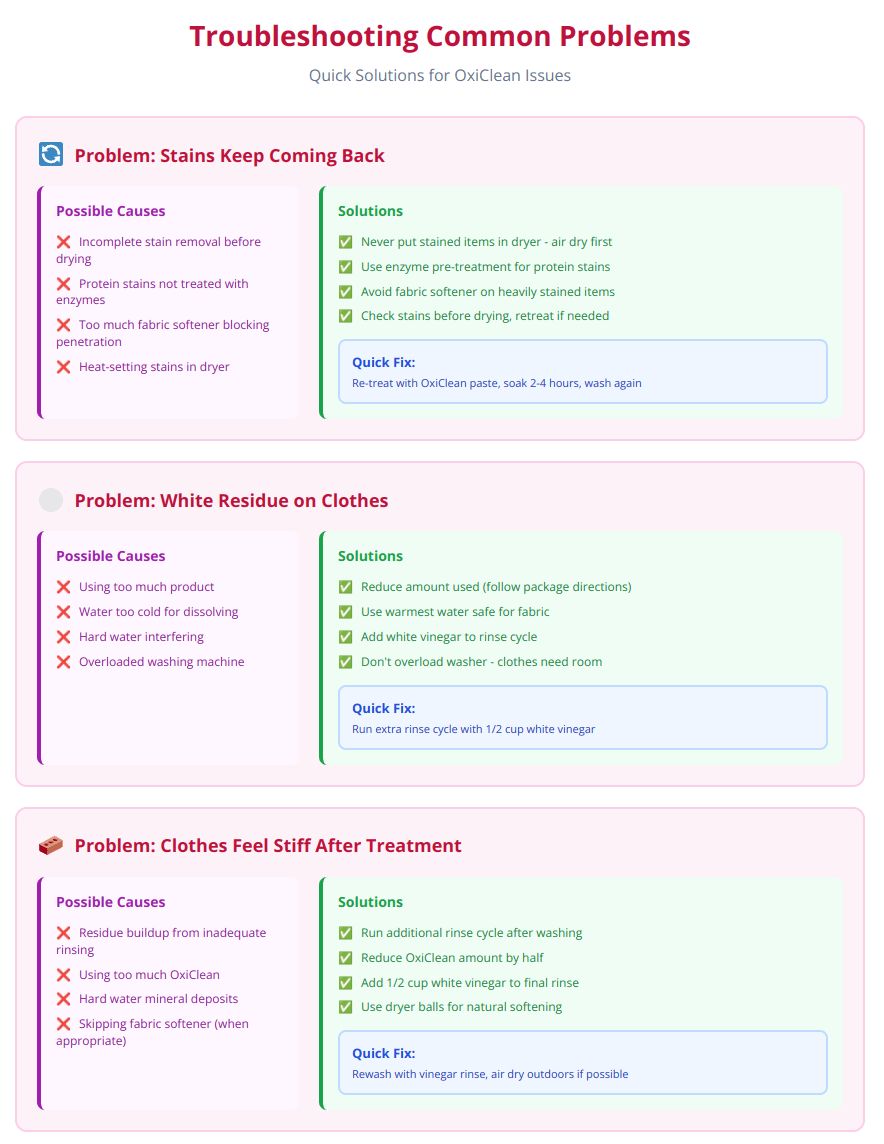
Most OxiClean problems are easily solved with simple adjustments to your routine or technique.
If you’re experiencing issues with OxiClean on your child’s clothes, our interactive OxiClean Troubleshooting Guide will walk you through step-by-step solutions based on your specific problem.
Problem: Stains Keep Coming Back
Possible causes:
- Incomplete stain removal before drying
- Protein-based stains not treated with enzymes
- Too much fabric softener preventing penetration
Solutions:
- Never put stained items in dryer
- Use enzyme pre-treatment for protein stains
- Avoid fabric softener on heavily stained items
Problem: White Residue on Clothes
Causes:
- Using too much product
- Water too cold for dissolving
- Hard water interfering with effectiveness
Solutions:
- Reduce amount used
- Use warmest water safe for fabric
- Add white vinegar to rinse cycle
Problem: Clothes Feel Stiff After Treatment
Solutions:
- Run additional rinse cycle
- Reduce OxiClean amount
- Add 1/2 cup white vinegar to final rinse
Regional Considerations: OxiClean Alternatives in the UK
For UK parents, Vanish Oxi Action is more readily available than OxiClean. Here’s how they compare and specific techniques for British households.
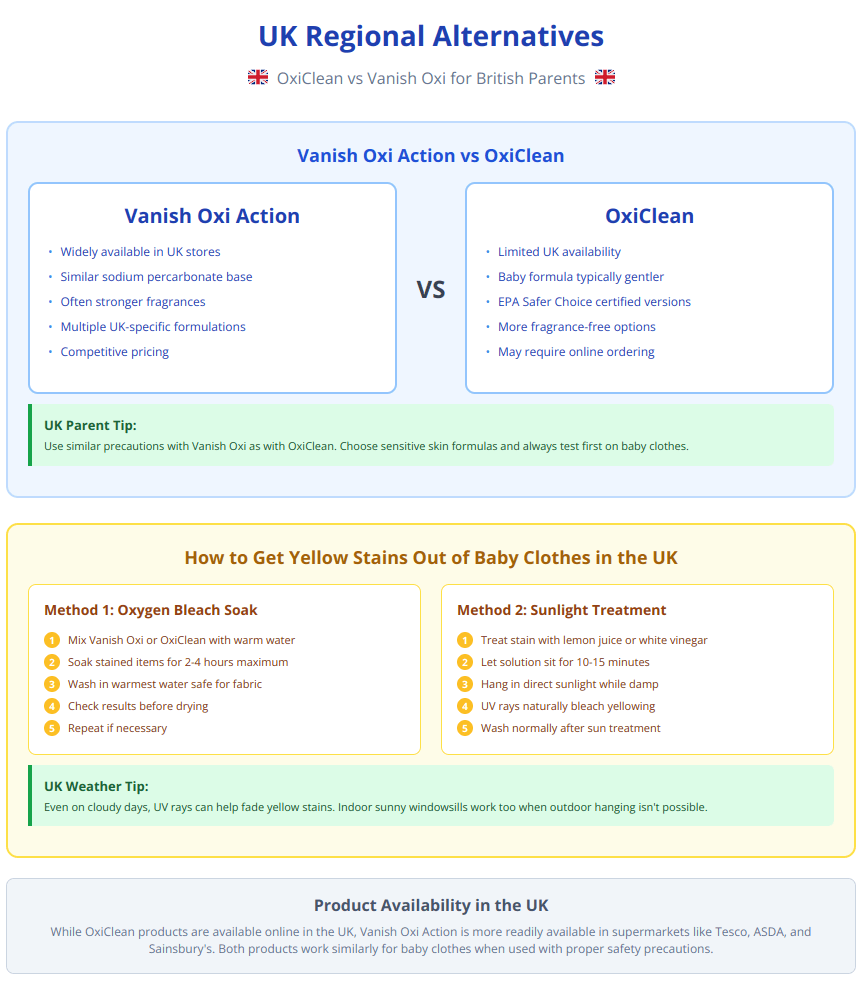
Whether you choose OxiClean or Vanish Oxi, the same safety principles apply for protecting your child’s sensitive skin.
Vanish Oxi Action
Can you use Vanish Oxi on baby clothes? Yes, but with similar precautions as OxiClean:
- Choose the sensitive skin formula
- Always rinse thoroughly
- Test on hidden areas first
- Use fragrance-free versions when available
Vanish vs. OxiClean comparison:
- Similar active ingredients (sodium percarbonate)
- Vanish often has stronger fragrances
- OxiClean Baby formula typically gentler
- Availability varies by region
UK-Specific Yellow Stain Removal
How to get yellow stains out of baby clothes in the UK:
Method 1: Oxygen bleach soak
- Mix Vanish Oxi or OxiClean with warm water
- Soak for 2-4 hours
- Wash in warmest water safe for fabric
Method 2: Sunlight treatment
- Treat stain with lemon juice or white vinegar
- Hang in direct sunlight while damp
- The natural bleaching action of UV rays helps fade yellowing
Cloth Diaper Considerations
Cloth diapers require special care when using OxiClean. Overuse can damage waterproof layers and reduce absorbency.
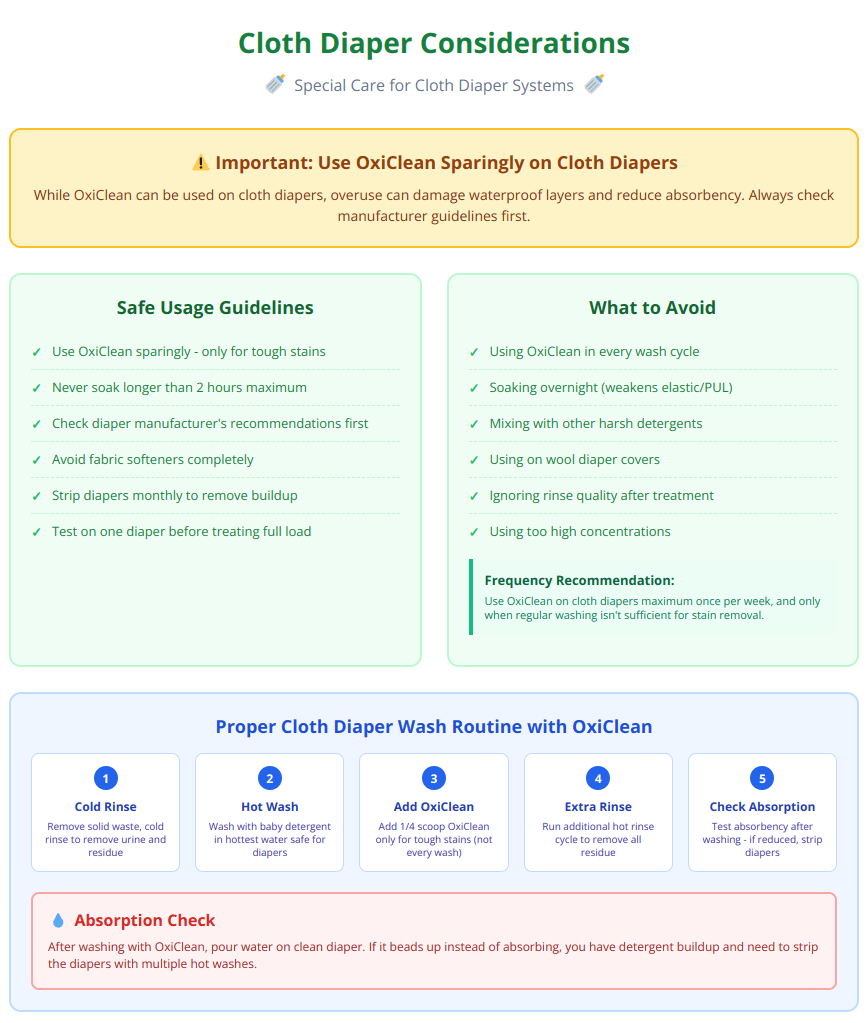
With proper precautions, OxiClean can help maintain your cloth diaper investment while keeping them thoroughly clean.
Special Care for Cloth Diapers
OxiClean and cloth diapers:
- Use OxiClean sparingly on cloth diapers
- Never soak longer than 2 hours
- Always strip diapers monthly to remove buildup
- Avoid fabric softeners completely
Proper cloth diaper wash routine with OxiClean:
- Cold rinse to remove waste
- Hot wash with baby detergent
- Add 1/4 scoop OxiClean for tough stains only
- Extra hot rinse
- Check absorption after washing
Building an Effective Stain-Fighting Routine
Success with stain removal starts with having the right supplies readily available and establishing good daily habits.
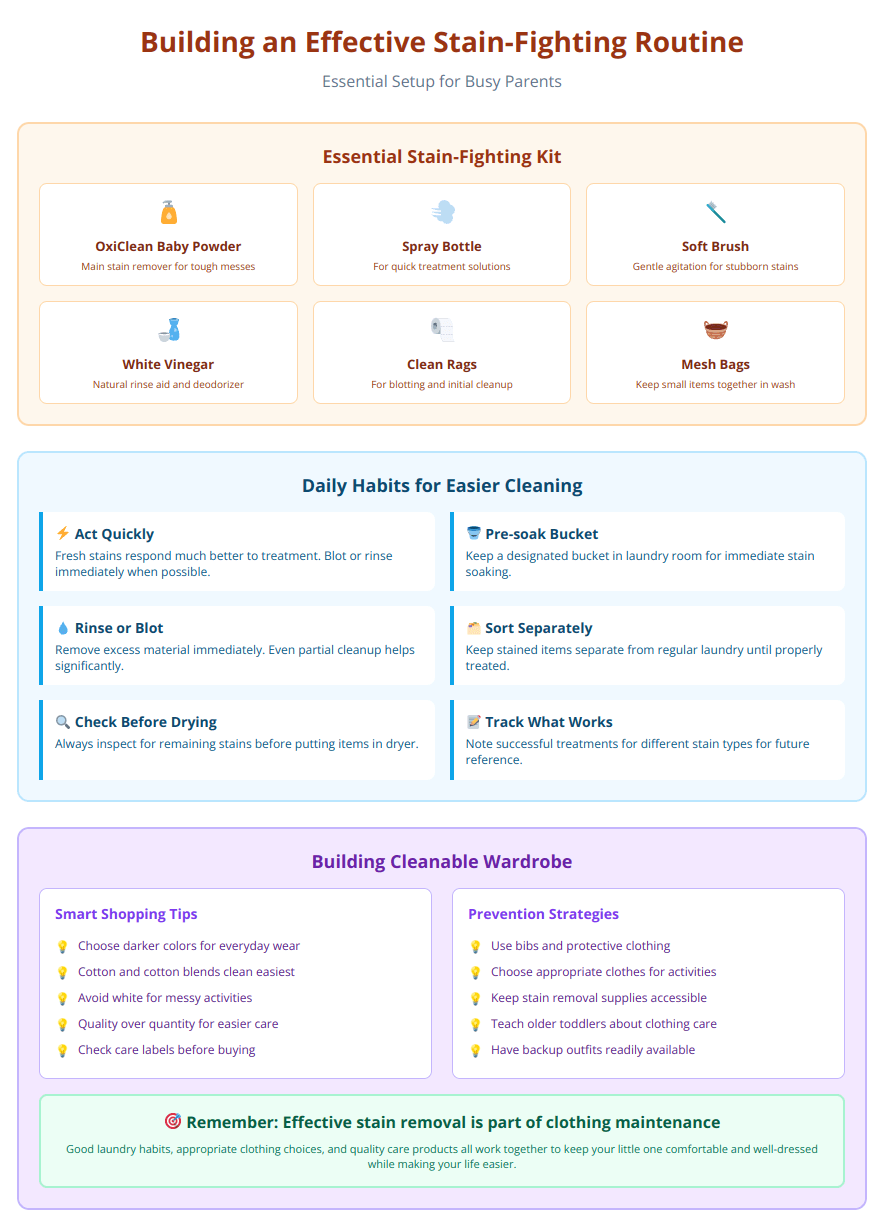
A well-organized routine makes stain fighting feel less overwhelming and more manageable for busy parents.
Essential Supplies for Parents
Basic stain-fighting kit:
- OxiClean Baby powder
- Spray bottle for quick solutions
- Soft-bristled brush
- White vinegar
- Clean rags or paper towels
- Mesh laundry bags for small items
Daily Habits for Easier Cleaning
- Act quickly on fresh stains
- Keep a pre-soak bucket in the laundry room
- Rinse or blot immediately when possible
- Sort stained items separately from regular laundry
- Check results before putting items in dryer
Building Your Toddler Clothing Essentials with Cleanability in Mind
When shopping for toddler clothes, consider:
- Darker colors hide stains better
- Cotton and cotton blends clean easily
- Avoid white for everyday wear
- Choose quality over quantity for easier care
Advanced Stain Removal Techniques
For set-in stains that resist normal treatment, these professional-grade techniques can often achieve results when other methods fail.
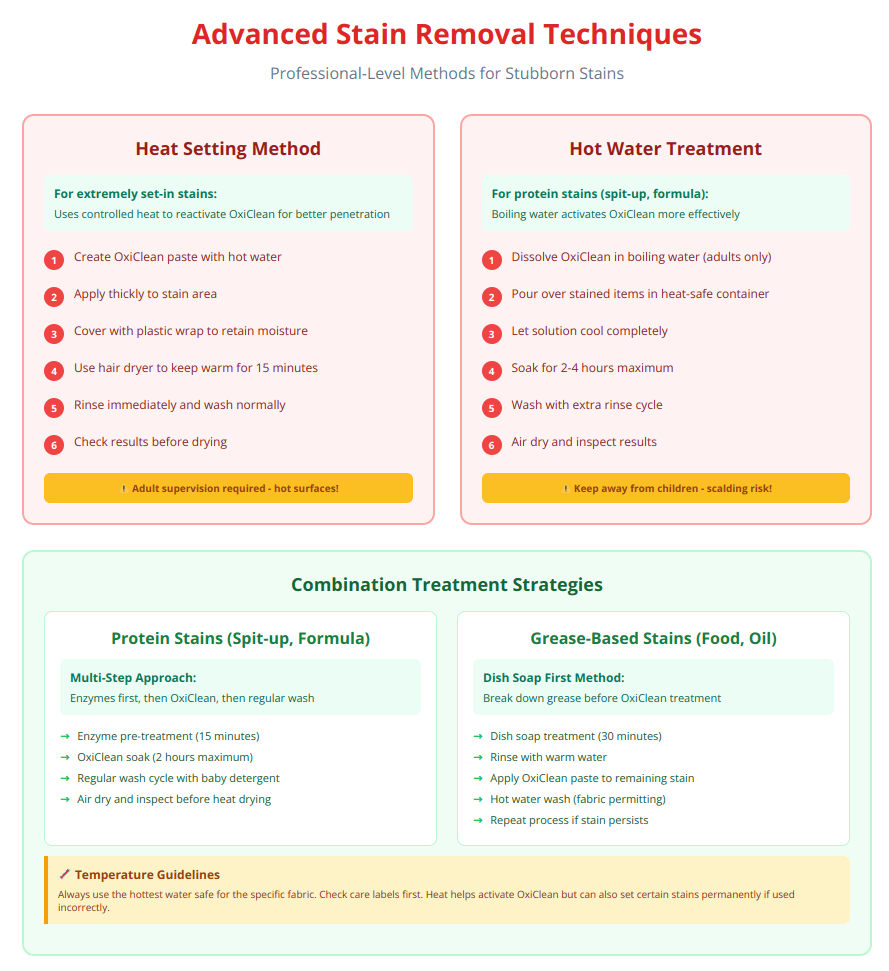
Always prioritize safety when using advanced techniques, especially those involving heat or extended treatment times.
Heat Setting for Stubborn Stains
For extremely set-in stains:
- Create OxiClean paste with hot water
- Apply to stain and cover with plastic wrap
- Use hair dryer to keep warm for 15 minutes
- Rinse and wash immediately
- Check before drying
Combination Treatments
For protein stains (spit-up, formula):
- Enzyme pre-treatment (15 minutes)
- OxiClean soak (2 hours)
- Regular wash cycle
- Air dry and inspect
For grease-based stains:
- Dish soap treatment (30 minutes)
- OxiClean paste application
- Hot water wash
- Repeat if necessary
Frequently Asked Questions
Can OxiClean damage clothes with repeated use?
Yes, if overused. Too much OxiClean or too frequent use can:
• Weaken fabric fibers
• Cause colors to fade
• Create residue buildup
• Damage elastic components
Safe usage: Limit to heavily stained items only, not every wash.
How long can you leave OxiClean on clothes?
Maximum recommended times:
• Pre-treatment: 10-15 minutes
• Soaking: 6 hours maximum
• Never overnight for baby clothes
Longer exposure increases risk of fabric damage and skin irritation.
Does OxiClean really whiten clothes?
Yes, but: OxiClean brightens whites by removing dingy buildup and stains, not by chemical whitening. It won’t make clothes whiter than their original color but will restore their brightness.
Which OxiClean is best for baby clothes?
For newborns: OxiClean Baby (fragrance-free, dye-free)
For sensitive skin: OxiClean Free & Clear
For tough stains: Regular OxiClean (with extra rinses)
For convenience: OxiClean Baby spray for quick treatment
Can you use OxiClean on everything?
No. Never use on:
• Wool, silk, leather
• Dry-clean only items
• Metal components (zippers, buttons)
• Swimwear with lycra/spandex
• Flame-retardant clothing (may reduce effectiveness)
What is the best stain remover for toddlers overall?
Top recommendations:
• OxiClean Baby – Best overall for safety and effectiveness
• Enzyme-based pre-treatments – Best for protein stains
• DIY hydrogen peroxide paste – Best for sensitive skin
• Cold water immediate treatment – Best first response
How much OxiClean should I use for my toddler’s clothes?
The amount depends on your load size and stain severity. Use our Dosage Calculator for personalized recommendations.
Professional Tips from Pediatric Experts
Dr. Sarah Williams, Pediatric Dermatologist
“The most common mistake parents make is not rinsing thoroughly enough. I recommend an extra rinse cycle for any baby clothes treated with stain removers. Also, if your child has eczema, stick to the mildest options and consider patch testing new products on a small fabric area first.”
Lisa Chen, Certified Lactation Consultant
“For breastfeeding mothers dealing with constant spit-up stains, I recommend keeping a small spray bottle with diluted OxiClean Baby solution ready. Spray immediately after incidents, and the stains will wash out much easier later. Just remember to rinse your hands after handling any cleaning products.”
Environmental and Health Considerations
Balancing effective cleaning with environmental responsibility and long-term health considerations benefits both your family and the planet.
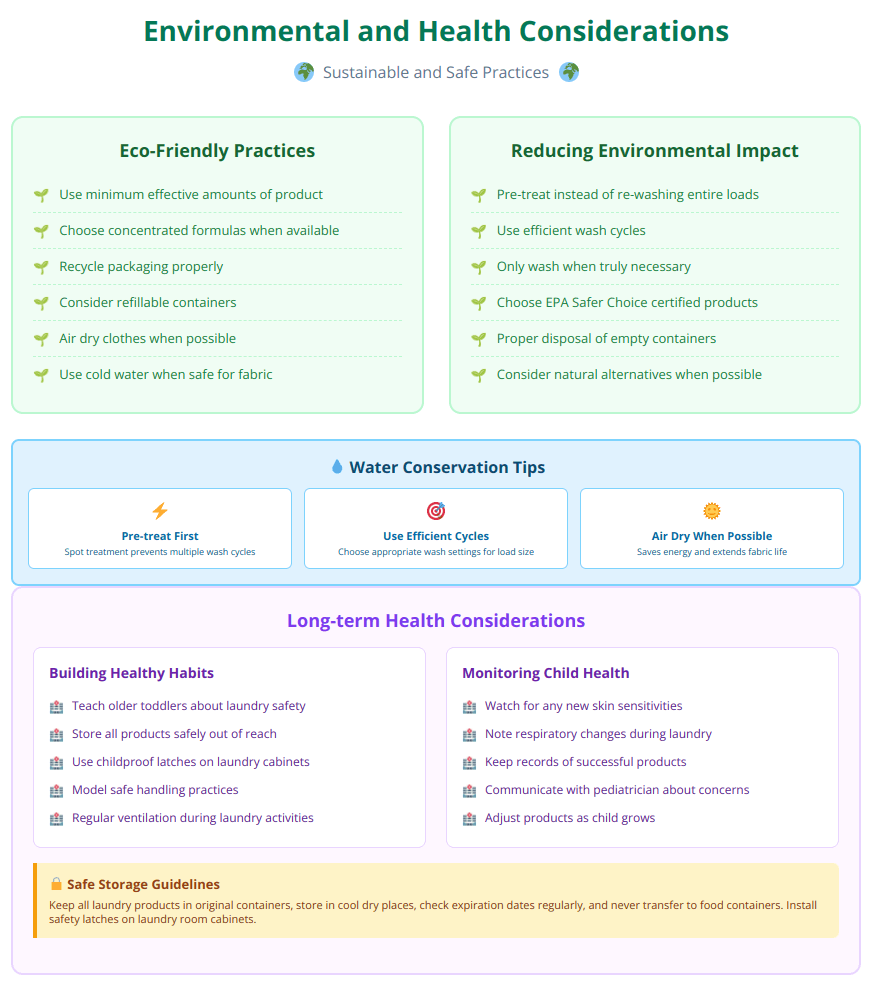
Small changes in your laundry routine can have significant positive impacts on both your child’s health and environmental footprint.
Eco-Friendly Practices
Reducing environmental impact:
- Use minimum effective amounts
- Choose concentrated formulas
- Recycle packaging properly
- Consider refillable containers
Water conservation:
- Pre-treat instead of re-washing
- Use efficient wash cycles
- Only wash when truly necessary
- Air dry when possible
Long-term Health Considerations
Building healthy habits:
- Teach older toddlers about laundry safety
- Store all products safely out of reach
- Use childproof latches on laundry room cabinets
- Model safe handling practices
Cost-Effective Strategies
Smart shopping and usage strategies can significantly reduce your stain-fighting costs without compromising effectiveness.
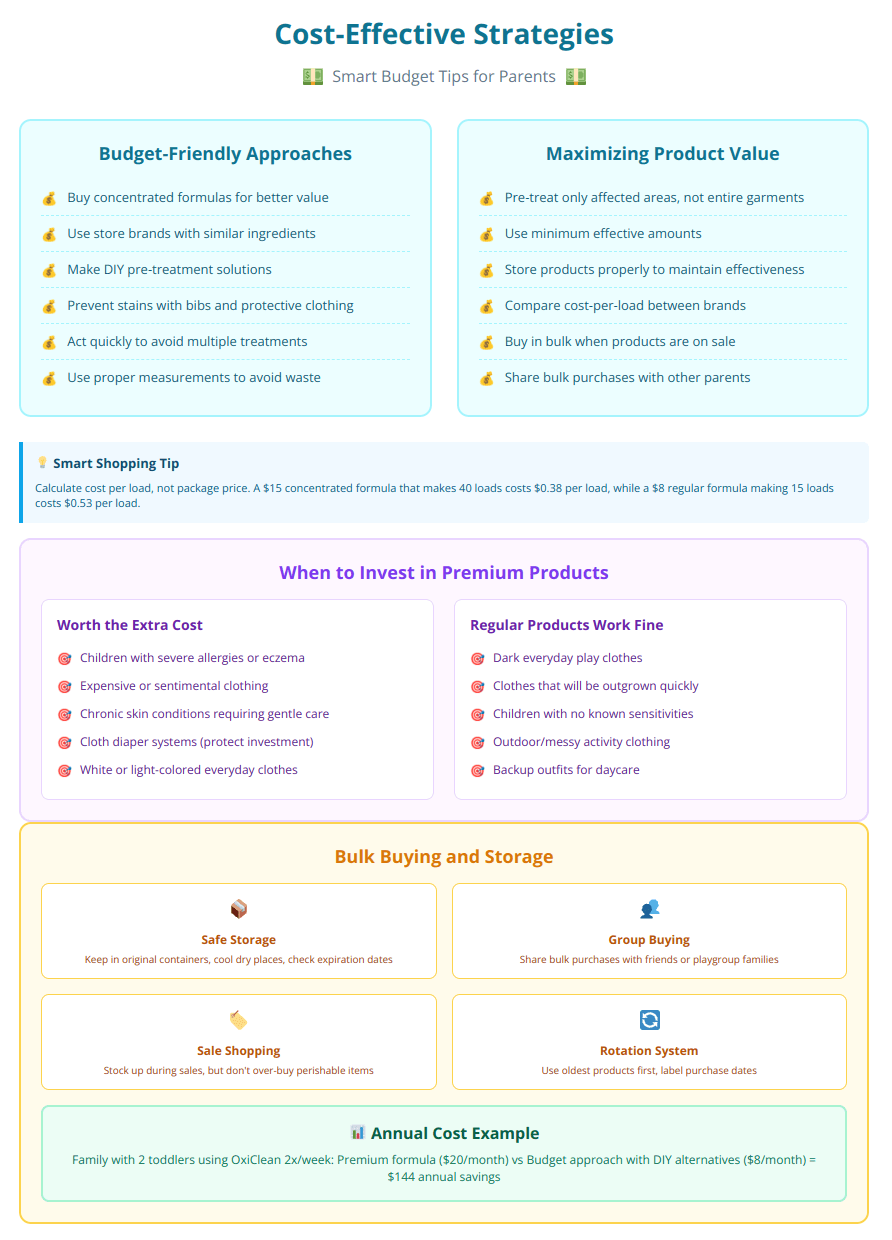
The key is finding the right balance between cost savings and the specific needs of your child’s sensitive skin.
Budget-Friendly Approaches
Maximizing value:
- Buy concentrated formulas
- Use store brands with similar ingredients
- Make your own pre-treatment solutions
- Prevent stains with bibs and protective clothing
When to invest in premium products:
- Children with severe allergies
- Expensive or sentimental clothing
- Chronic skin conditions
- Cloth diaper systems
Bulk Buying and Storage
Safe storage tips:
- Keep in original containers
- Store in cool, dry places
- Check expiration dates regularly
- Never transfer to food containers
Creating a Sustainable Laundry Routine
A well-planned routine reduces stress, saves time, and teaches children valuable life skills while keeping clothes clean and fresh.
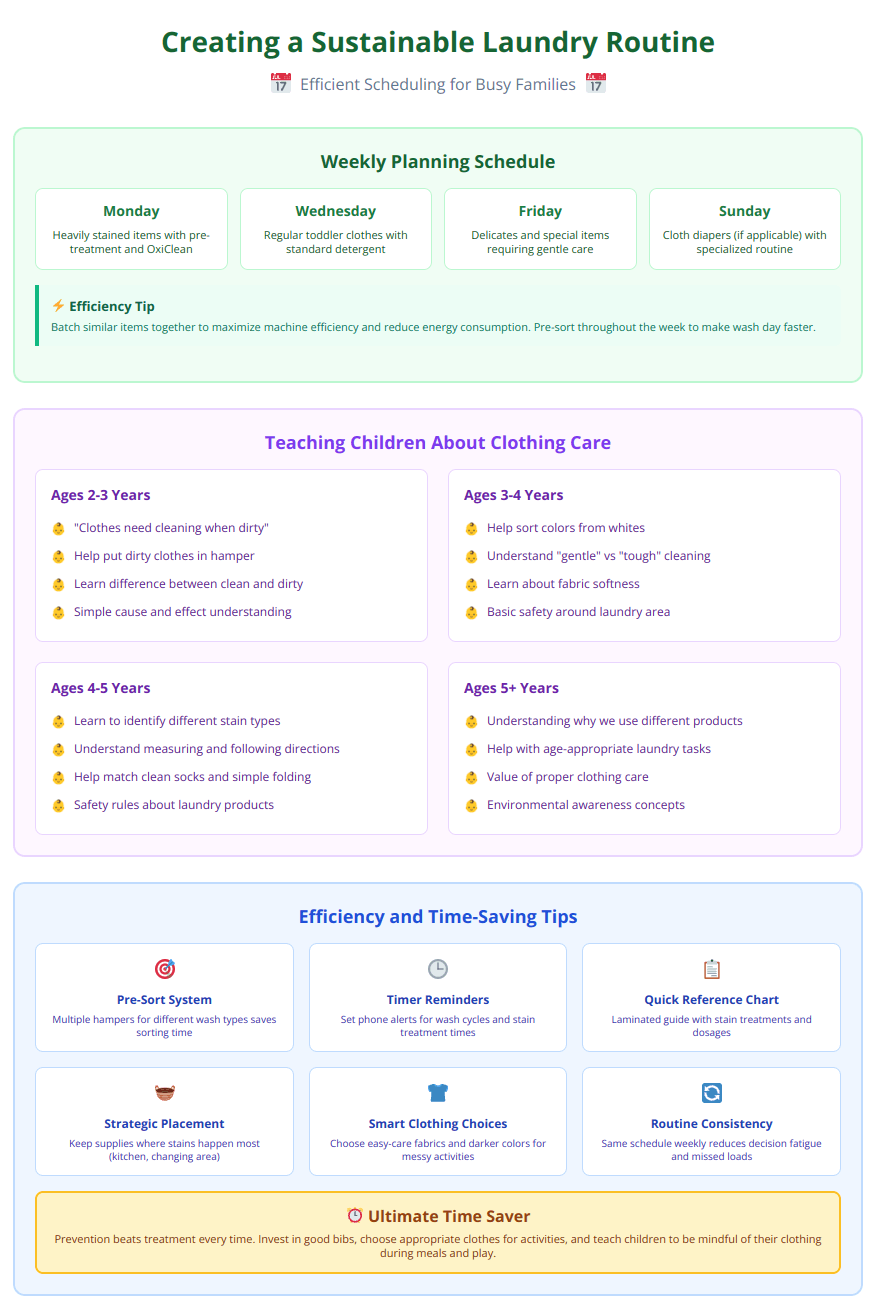
Remember, the best routine is one that works for your family’s schedule and adapts as your children grow and develop.
Weekly Planning
Efficient wash scheduling:
- Monday: Heavily stained items with pre-treatment
- Wednesday: Regular toddler clothes
- Friday: Delicates and special items
- Sunday: Cloth diapers (if applicable)
Teaching Children About Clothing Care
Age-appropriate lessons:
- 2-3 years: “Clothes need cleaning when dirty”
- 3-4 years: Help sort colors from whites
- 4-5 years: Learn to identify different stain types
- 5+ years: Understanding of why we use different products
As children learn about choosing durable clothes, they also begin to understand the value of proper care.
Conclusion
Using OxiClean on toddler and baby clothes can be safe and highly effective when done correctly. The key is choosing the right formula for your child’s needs, following proper usage guidelines, and always prioritizing complete rinsing to prevent residue buildup.
Key takeaways for parents
- Start with the gentlest option: OxiClean Baby or Free & Clear formulas are specifically designed for sensitive skin and provide excellent stain removal with reduced risk of irritation.
- Act quickly on stains: Fresh stains respond much better to treatment than set-in ones. Keep a pre-treatment solution ready for immediate action.
- Never skip the test: Always test new products on a hidden area first, especially for colored or special fabrics.
- Prioritize thorough rinsing: Run extra rinse cycles when treating baby clothes to ensure no residue remains that could irritate delicate skin.
- Know when to avoid: Certain fabrics (wool, silk, leather) and medical conditions (active eczema, allergies) require alternative approaches.
- Monitor your child’s skin: Watch for any signs of irritation and discontinue use if reactions occur.
Final recommendations
For families with newborns and sensitive children, investing in OxiClean Baby products provides the best balance of safety and effectiveness. The EPA Safer Choice certification and pediatric-approved formulation offer peace of mind while tackling even the toughest toddler stains.
Remember that effective stain removal is just one part of maintaining your child’s wardrobe. Proper fabric care, appropriate clothing choices, and good laundry habits all contribute to keeping your little one comfortable and well-dressed.
Consider building a comprehensive stain-fighting arsenal that includes OxiClean products alongside gentler alternatives like enzyme cleaners and DIY solutions. This approach ensures you’re prepared for any mess your toddler can create while maintaining the highest safety standards for their delicate skin.
Most importantly, don’t stress about every stain. Children’s clothes are meant to be lived in, played in, and yes, occasionally stained. With the right tools and techniques, you can keep them looking great while focusing on what really matters – watching your little one explore and grow.
For ongoing support with your laundry routine, bookmark our OxiClean Troubleshooting Guide, Interactive Stain Identification Guide, and Dosage Calculator for quick reference when issues arise.

